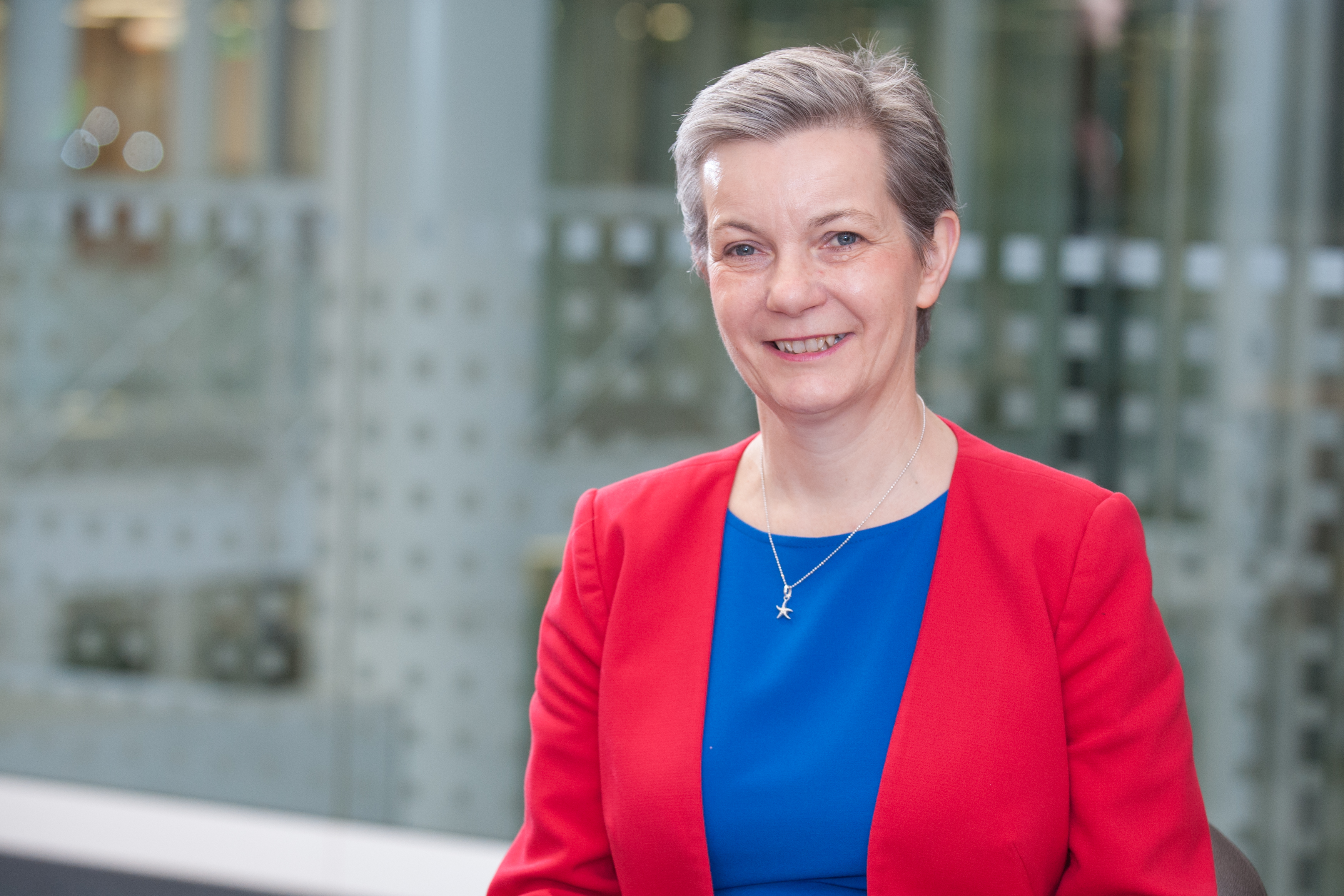We must secure the “beating heart” of the health and care system

The response of the Nursing and Midwifery Council (NMC) to Covid-19 will prove crucial to increasing staffing numbers. The regulator’s Chief Executive, Andrea Sutcliffe, was on hand to speak to Hospital Times Editor David Duffy about some of the challenges the profession faces.
Needless to say, Andrea Sutcliffe’s role, as chief regulator of the entire nursing and midwifery profession, a post she has been in since January 2019, has taken on profound importance in the face of the Covid-19 pandemic.
“We must ensure that as the regulator we are doing everything we can to ensure we’re ready to deal with this pandemic,” she says. At the heart of the organisation’s strategy is supporting the objective of getting staff to where the health and social care sector needs them most. To this end the NMC has established a temporary emergency register with the specific aim of getting numbers to the frontline to supplement the current workforce and plug the gaps that Covid-19 is causing. However, achieving this is anything but simple.
As Andrea warns, the UK will be losing staff across the health and social care spectrum. “There are going to be gaps in medical assessment units and in nursing homes. There are also going to be gaps in community care and in the critical care environments” she says. But Andrea knows more than most that it isn’t just a numbers game. Specific considerations need to be given to each applicant as well as to the capacity of the system to process the volume of responses. While all parts of the system are desperate for staff, the NMC strategy for increasing staffing levels is understandably layered. Although eager to feed resource into the health and care system, Andrea wants to make it clear that for anybody who is considering returning to the frontline, “it will absolutely depend on their skills, their experience, where they want to work and what they want to do. It is their decision.”
Despite challenges, engagement has been immensely positive. As of today, almost 11,000 people have signed to the temporary register.
Who, what, where and when?
So, how exactly is this key regulator working to secure staffing numbers? And who exactly are they asking to return? Well, the NMC’s first port of call has been those who have very recently left the register, within the last three years, to come back to the frontline. The temporary register was opened to accommodate these people on 27 March.
The second cohort is made up of overseas applicants. These candidates will have already applied to be on the permanent register, but will not yet have undertaken their Objective Structured Clinical Examination (OSCE). Many of these nurses will have been unable to take the exam due to the pandemic having closed exam centres. In the absence of OSCE certification, the NMC is “putting certain conditions of practice on this group as we have not yet been able to validate their eligibility or qualification to be on the full register,” says Andrea, reflecting on the additional supervision that may be required for this particular group.
Uptake from overseas applicants has been exceptional, with over 1,500 responses so far – a demonstration of how important our overseas workforce is for our health and care system. Andrea is confident that further response to this invitation will remain high, as these people already live in the UK and have actively demonstrated a desire to work for the NHS and social care.
Next, the NMC is extending its invitation for former nurses to re-join the register to those who left four to five years ago. Andrea admits that information on this group is less clear, as peoples’ lives change and those in this group might no longer have a link with the health and care sector.
While many former nurses might have a strong desire to return to the frontline, it may be the case that they have a pre-existing health condition and therefore the risk of exposure to Covid-19 could be too great for them. For those who have useful expertise but cannot use it on the frontline, Andrea is keen to highlight there is plenty of scope to apply their expertise outside of direct clinical settings. Additional expert resource to the NHS 111 service is but one example. “The fact that you might have an underlying condition yourself isn’t necessarily a barrier to making an incredibly valuable contribution,” she explains.

Students
At the other end of the experience spectrum, there is a vast pool of untapped talent within our clinical educational institutions. Students will have an increasingly vital role to play in expanding health and care staffing numbers, and nowhere is this truer than in nursing. The challenge for Andrea and her team is in ensuring that the right level of expertise is identified for each student and applied in the appropriate way, whether it be dealing directly with Covid-19 patients or otherwise.
While the decision to open the temporary register to nursing students has not yet been made, the NMC is examining the way in which its own standards apply to university courses and is also developing ways in which these courses could be delivered in clinical practice settings. Nursing students in their final six months of university would typically undertake a three-month clinical placement, so the NMC has made it possible for students to extend their time in a clinical environment to contribute to the Covid-19 response. “We have had an astonishing number of students respond to this call already,” said Andrea. She is incredibly grateful for the help the NMC has received from education commissioners, the Council of Deans and universities themselves to coordinate students and help such a positive response.
While the immediate priority is accurately assessing who can make contributions to the NHS and social care and how, there is certainly an appreciation within the NMC that the pandemic will cause logistical disruption to the academic calendar. The regulatory body is looking at ways to minimise disruption for students when we are finally on the other side of this pandemic.
Maintaining a healthy workforce, in body and mind
“We owe these people an enormous debt of gratitude, coping with something that they have never had to cope with before. None of us born since the Second World War will have ever seen anything like this,” says Andrea, who is not one to pretend that it will be easy for anyone looking to make that invaluable contribution in such a time of crisis. The NMC must consider this while ensuring the existing workforce continue to receive the support from their regulator that they need. Achieving this will be no small feat.
“We must instil confidence in our staff that we, as their regulator, understand the context in which they are working.” Along with the other key healthcare regulators, the NMC signed up to a joint letter on 2 March to make this extremely clear. The letter recognises that within these challenging circumstances, regulatory standards should be sufficiently flexible to inform decision-making when dealing with Covid-19.
We owe these people an enormous debt of gratitude, coping with something that they have never had to cope with before. No one born since the Second World War will have ever seen anything like this
Andrea Sutcliffe, Chief Executive, Nursing and Midwifery Council
Providing clear and concise information is key. Andrea cites the creation of a coronavirus hub, available on the NMC website, as an essential tool in detailing expected standards for nurses, midwives and nursing associates and how they can adapt to deal with Covid-19. Further to this, the NMC can directly relieve pressure. Extending revalidation deadlines is one option here. Andrea has sought amendments to NMC rules to help provide further relief in this regard. “These measures can at least go some way to alleviating the stress our registrants are under.”
Ensuring consistency of values
The NMC is one of the most respected healthcare regulators in the world. While Andrea’s long-term plans for the organisation are sure to have changed, the values that have been set out recently are guiding the organisation through this crisis. “I know that we have chosen the right values to drive the ways in which we work and from the outset we have set out to be ambitious, fair, kind and collaborative. These are the values that drive everything we do.”
Long term consequences for the profession
When we last spoke to Andrea, she was Chief Inspector of Adult Social Care for the Care Quality Commission (CQC). Back then she was clearly frustrated with the lack of respect shown towards the social care profession by the public and fellow professionals from across the sector. Sadly, a few years and a global pandemic later, that frustration understandably remains.
Recent reports show the social care workforce is under more pressure than ever to protect some of the most vulnerable people in the country. Ominous figures continue to seep out from the Government that the death toll is being underestimated due to a lack of reporting of the social care situation. While “claps for carers” have shown positive public support, more must be done to highlight the essential work taking place outside of hospital Intensive Care Units.
“Leaders across the social care spectrum have continuously expressed their disappointment that frontline social care workers are not getting the recognition they deserve.” To remedy this, NMC has sought to raise the profile of this crucial profession and Andrea hopes that this pandemic will finally provide the necessary impetus to highlight the crucial work of this sector.
However, for all the negatives and vulnerabilities in our health and care system that this pandemic has highlighted, the image of the clinical professions has forever been strengthened. Now more than ever, the public are seeing the skills and tireless dedication of nurses and midwives, not least because of the incredible care dedicated to our Prime Minister during a critical stage for his health and recovery. Andrea recognises that this crisis has already highlighted one simple fact: “Nursing and midwifery are the beating heart of our health and social care system. It is their professional skills, their expertise and their dedication that keeps the system running. The people across this country are now acutely aware of this more than ever.”
More information can be found at NMC.org.uk/news/coronavirus/
